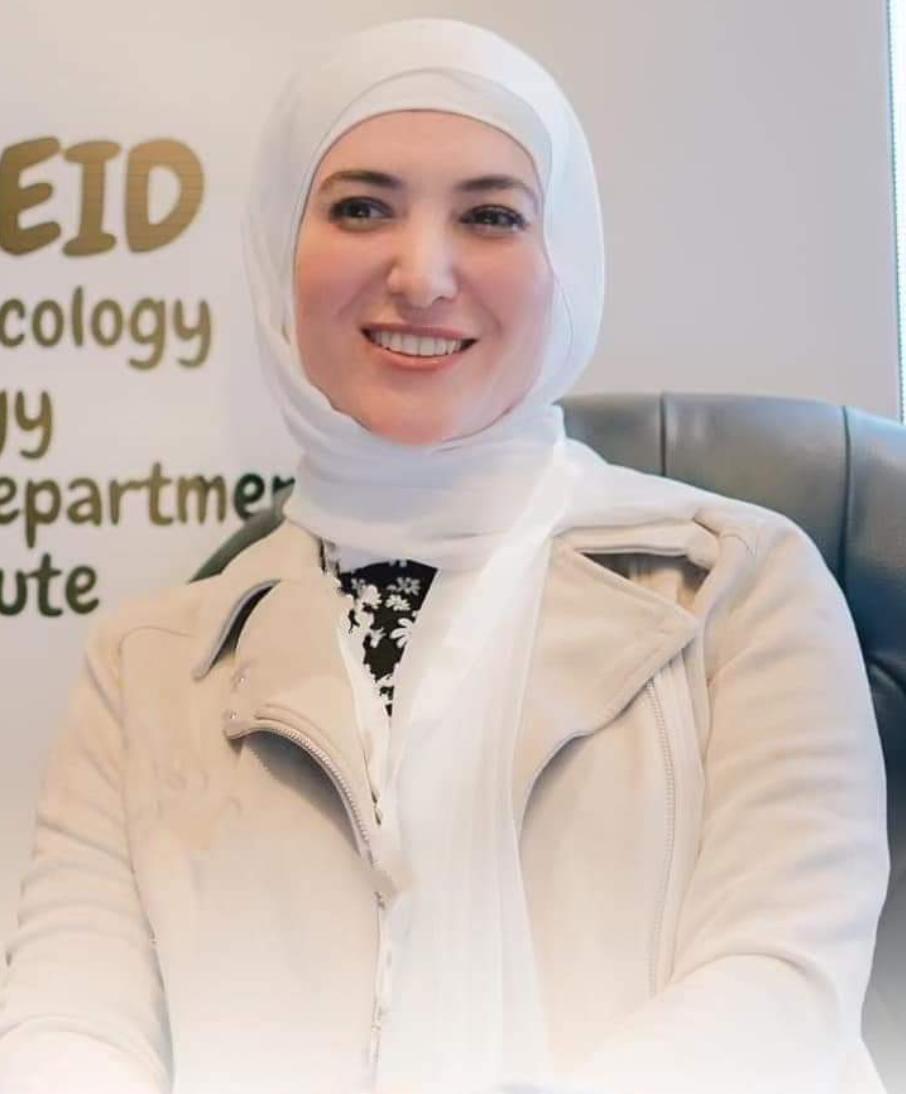Dr. Narmin Gamal El-Din
Consultant Pediatrician, Allergy and Immunology

- Name: Dr. Narmin Gamal El-Din
- Phone: 01201012112 01117940047
- City: Cairo
- Area: Maadi
Professor Dr. Narmin Gamal El-Din
Consultant Pediatrician, Allergy and Immunology
Academic Qualifications:
PhD in Pediatrics: Her studies focused on common and chronic diseases in childhood, giving her the ability to deal with a variety of cases.
Allergy and Immunology Consultant: She has extensive experience in diagnosing and treating allergic conditions using the latest treatment protocols.
Location:
Address: 15 B El-Khamsin St., Zahraa El-Maadi, 3rd floor, Cairo.
Working hours: It is preferable to call for accurate details about working hours.
Clinic number:
01201012112
01117940047
Services provided:
Growth and development follow-up:
Comprehensive assessment: Periodic examination of the child's growth and physical and mental development.
Support strategies: Providing advice to parents on how to support children with special needs.
Allergy treatment:
Comprehensive diagnosis: Tests to identify types of allergies (food, environment, medications).
Treatment plans: Including immunotherapy and drug therapy.
Children's nutrition:
Nutrition consultations: Providing advice on breastfeeding and feeding newborns.
Therapeutic programs: Treating cases of malnutrition and obesity by designing appropriate nutritional plans.
Comprehensive medical care:
Vaccinations: Providing all basic and advanced vaccinations, and following up on their dates.
Special cases: Following up on cases of delayed growth, premature babies, and any medical conditions.
Treatment of specific cases:
Hyperactivity and attention deficit: Comprehensive diagnosis and treatment with multiple intervention plans.
Other problems: Such as tonsillitis, cough, and treatment of abdominal pain.
Additional information:
Patient reviews: You can view patient reviews and opinions online, which helps you make an informed decision.
Personalized consultations: Dr. Nermin provides personalized consultations based on the child's special needs.
For reservations and inquiries:
It is recommended to book in advance to set an appointment through the mentioned numbers.
FAQ
Pneumonia is an infection in the lungs, and it shows through the following symptoms:
1. Cough: It could have mucus or it might be dry.
2. High fever: Fever with chills (feeling cold with heat).
3. Difficulty breathing: Feeling like you can't take a deep breath.
4. Chest pain: The pain gets worse when you breathe deeply or cough.
5. Fatigue and exhaustion: Feeling extremely tired, unable to get up.
6. Loss of appetite: Not feeling like eating as usual, and sometimes feeling nauseous.
7. Excessive sweating: Especially at night.
8. Muscle aches: Feeling body aches like you have the flu.
9. Mental confusion: Older adults may feel confused or have trouble thinking clearly.
Note: These symptoms can be severe or mild depending on age and health condition.
The recovery time from pneumonia depends on the severity of the condition and the patient's age:
1. Mild cases: Recovery usually takes 1 to 3 weeks.
2. Severe cases or elderly patients: Recovery may take 6 to 8 weeks or longer.
Tips for faster recovery:
1. Get plenty of rest.
2. Stay hydrated by drinking lots of fluids.
3. Follow your doctor’s instructions and take all prescribed medications.
If complications arise or symptoms persist for an extended period, consult your doctor immediately to prevent further health issues.
Pneumonia is an infection that affects the lung tissue itself. This means the air sacs in the lungs become inflamed and may fill with fluid or pus. Its symptoms are clear and include:
1. High fever with chills.
2. Severe coughing, often accompanied by mucus or phlegm.
3. Difficulty breathing, and sometimes chest pain during deep breaths or coughing.
Bronchitis, on the other hand, is an inflammation of the tubes that carry air to the lungs (bronchial tubes). It’s often caused by viral infections or continuous smoking. The main symptoms are:
1. Persistent cough (which may be dry or produce mucus).
2. A feeling of tightness or mild pain in the chest.
3. Wheezing sounds when breathing.
4. General fatigue and exhaustion.
In summary, pneumonia directly impacts the lungs and tends to be more severe, while bronchitis affects the airways leading to the lungs and doesn’t involve the lung tissue itself.
Yes, pneumonia can be contagious, especially if it's caused by bacterial or viral infections. The infection can spread from one person to another through:
1. Coughing and sneezing: From an infected person.
2. Direct contact: Such as shaking hands with someone who is sick.
3. Contaminated air: Inhaling air that contains germs.
To reduce the risk of infection, it’s important to wash your hands frequently, avoid direct contact with sick individuals, and wear a mask if you’re in crowded areas or around infected people.
Symptoms of bronchitis may include:
1. Persistent cough: It can be dry or accompanied by mucus.
2. Difficulty breathing: You might hear wheezing (a whistling sound when breathing).
3. Chest discomfort: A feeling of tightness or heaviness in the chest.
4. Fever: A slight increase in body temperature.
5. General fatigue: Feeling tired and drained most of the time.
6. Nasal congestion or sore throat: A stuffy nose or throat pain might occur.
Note: Bronchitis is often caused by a viral or bacterial infection. The cough may persist even after other symptoms improve.
Bronchitis (acute bronchial inflammation) is usually not dangerous if treated properly. However, in some cases, complications can occur, such as:
1. Chronic bronchitis: If it lasts for a long time or if flare-ups are frequent.
2. Underlying health conditions: Conditions like asthma or heart diseases may increase the risk of complications.
3. Age and weakened immune system: The body may be less able to fight off infections.
4. Rare complications: Such as progression to pneumonia or breathing difficulties.
It is important to consult a doctor when symptoms appear to ensure appropriate treatment and prevent complications.
